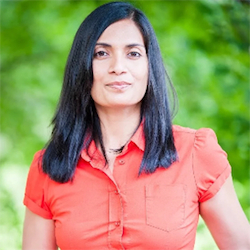The Impact Scholar Community supports early-career management scholars in developing impact capabilities. An initial inquiry reveals where we want to help most.
Sylvia Grewatsch (Brock University), Nicholas Poggioli (Appalachian State) and Garima Sharma (American University) are organizers of the Impact Scholar Community.
Early-career management researchers who care about impact face unique challenges. Colleagues often advise us to wait until after tenure to focus on the broader effect that our research has.
However, we believe that impact cannot simply be added onto a well-established research program. Instead, researchers need to build “impact capabilities” early in their career. In response, the Impact Scholar Community seeks to support early career researchers who want their research to impact practice. It is also for researchers who seek impact beyond their research, using their position as academics to enact change. In this article, we talk about what impact means to management researchers and how the Impact Scholar Community aims to advance it.
About the Impact Scholar Community
The Impact Scholar Community was founded in 2019 by the Greening Team of the Organizations and the Natural Environment Division of the Academy of Management (AOM) with support from the Academy of Management Special Projects Fund. The Community builds on existing efforts to create research impact, by groups including Responsible Research in Business and Management (RRBM) and the Network for Business Sustainability (NBS).
Our particular focus is on providing the social and technical infrastructure that early-career researchers need to connect their rigorous research with practical and social impact. Management scholars at any stage are welcome to join the Community and support early-career researchers: http://one.aom.org/impact-scholar-community.
Surveying Members on Impact
As part of launching the Impact Scholar Community, we asked management researchers to answer, “What does impact mean to you?” and to identify impact topics for the Community to address. We received about 200 responses from around the world. More than half of responses came from Assistant Professors/Lecturers (24%), Doctoral Students (17%), and Senior Lecturers/Associate Professors (13%), with the remainder coming from a variety of positions across the academic and practice career spectrum, including Postdoctoral Researchers, Deans, CEOs, and Chief Sustainability Officers.
The word cloud below shows the frequency of different terms used by respondents to describe what impact means to them. For each prominent word (e.g., ‘research’), we returned to the responses mentioning the word and categorized them into sub-themes.

What Impact Means to Management Researchers
The sub-theme analysis suggests the most important concepts to respondents were ‘research,’ ‘change,’ ‘world,’ ‘real,’ and ‘community.’ Here’s how they expanded on those themes and concepts. Ideas appearing more frequently are listed first.
1. ‘Research’ is the word respondents used most to describe impact. In responses mentioning the word, they elaborated on it in these ways:
Translation. They emphasized translating research insights into the practice context and creating research-based tools for practitioners.
A research process conducive to impact. Approaches suggested including co-creating research with stakeholders, action research, engaged scholarship, and joint academic-practitioner work.
Asking relevant questions. One respondent commented: “Research questions should be derived from relevant, real-life problems (not gaps in our theoretical understanding).” Another wrote, “[Impact comes from] asking questions that practitioners are interested in understanding better.”
Developing nuanced understanding of the phenomenon. Research should mean “giving new meanings and understanding to people,” one respondent wrote. It should critique the taken-for-granted and show the everyday in a new light.
Rigorous research which builds legitimacy. Legitimacy enables researchers to promote their findings in public debates. One person wrote: “As a junior scholar, [impact] means staying committed to excellent academic work to be able to build a platform for having a voice for real-world change in the longer term.”
Using theoretical lenses such as practice theory which allow for concrete, practitioner-relevant insights.
Influencing academia. Impact within academia comes from citation counts and generating knowledge that others can extend.
One person comprehensively described impact as the dimensions in the research excellence framework: “outputs (publications, performances, exhibitions), impact beyond academia, institutional environment that supports research.”
2. Use of the word ‘Change’ showed that respondents saw impact in terms of positive change related to specific issues and stakeholders. They expanded on the term in these ways:
Academia can make the world a better place. Respondents listed important issues researchers can address, such as inequality, poverty and social and environmental justice.
Policy advocacy or intellectual activism. Researchers can go beyond being an “armchair academic.” One person wrote: “[Impact means] doing research that contributes to solving societal problems, not writing about change but enacting change.”
Affecting specific stakeholder groups. Research can help the marginalized or improves decision-making by policy makers, community, activist groups, students and businesses.
We saw a tension: Some respondents saw impact as concrete change to practice within organizations, while others described change at a more systemic level in terms of ecosystems, institutions, and public policy. One member wrote: “Impact for me means taking our research insights beyond our own disciplinary boundaries, and enriching debates in wider societal spheres, such as policy-making.”
3. Respondents frequently used the words ‘Real’ and ‘World.’ Some responses described academia as existing outside of common events and situations; impact meant providing value to those ‘in the real world’. Respondents using these words mentioned:
Meaningfulness of work. “The work I do is meaningful in the real world,” wrote one person: i.e. those outside of academia can use the research to improve their lives. Another member said that impact means that “[I] address real problems that matter to people.”
Addressing “real world problems,” “real world challenges,” or helping those with “real world responsibilities.” “[Impact] means producing research that prioritizes advancing knowledge on how to solve complex societal issues over theoretical contributions (although I don’t believe it is always an either/or issue).”
Developing teaching methods and curricula for competencies required in the real world; teaching is a path to impact.
4. Impact relates to ‘Community’ and investing in research sites/participants and the community beyond research. Specifically, respondents mentioned:
Supporting the research context and participants who give time and inputs. Impact means giving back to those who helped. “My projects are mostly with Brazilian farmers. I feel they are giving me a lot in terms of enriching my knowledge…but I am not giving back anything to them…to repay for this gift. Impact would be using this knowledge so that they can also have an advantage and improve their lives.” Another respondent commented, “I study PWD [People with Disabilities] and Gender in ASEAN [Association of Southeast Asian Nations], and at times am overwhelmed when communities I research ask if I have solutions, can I help them in any way?” Another respondent mentioned volunteering and using time outside academia to give back to valued communities.
Including the voice of the community in the research process. “Impact is inclusion,” one person wrote.
Volunteering and using their time outside of academia to give back. As with teaching, this theme of impact beyond one’s own research was less frequent.
Next Steps for the Impact Scholar Community
We celebrate the diversity in how management researchers see and aim for impact! The goal of the Impact Scholar Community is to support each other in achieving our visions of impact and, overall, steadily increasing the impact of management and sustainability research.
In addition to asking respondents what they think of impact, we also asked what specific impact topics the Impact Scholar Community should address. Responses are listed at the end of the article. We treat this list of topics as a living document and invite you to add to it by filling in the signup form below or emailing us.
As concrete next steps, the Impact Scholar Community will address its members’ interests through online and in-person events and curated resources like databases, blog posts, and other communications.
How to Join the Impact Scholar Community
Join the Impact Scholar Community by signing up at http://one.aom.org/impact-scholar-community.
For questions, write to Sylvia at sgrewatsch@brocku.ca, Nicholas at poggiolin@appstate.edu, or Garima at gsharma@american.edu.
Topics Identified by the Impact Scholar Community
Fostering systems/institutions that reward impact
Creating leading vs. lagging measures of impact, at the same time, critically evaluating quantification of impact
Encouraging journals to include impact as one of the criteria for publication
Publishing work such as action research in top-tier journals, creating a system of reviewers who can understand/evaluate such work
Understanding ways in which universities around the world support impact work e.g., building a case for impact work in tenure and promotion, adjusting the tenure clock to allow for impact work
Organize to revise the tenure system to include impact
Building personal resilience in face of institutional/professional resistance toward impact
Finding employment at schools that encourage impact work. Claiming the identity of a scholar who cares about impact when entering the job market.
Conducting impact-focused research
Getting started as a PhD student, postdoc or junior faculty
Fostering research collaboration with the industry as an early-career researcher
Managing inter-disciplinary, inter-sector impact focused teams; IRB approvals; ensuring rigor
Understanding models of co-creating research with stakeholders including the potential risks
Getting trained in research designs for impactful research
Finding a relevant research question, studying a novel phenomenon
Reading stories of early-career, pre-tenure researchers who have sought synergies between high-quality research and impact
Finding funding sources for research impact
Disseminating research insights
Learning social media strategies for disseminating research
Writing for translation journals such as The Conversation, writing op-eds, opinion pieces, and evidence-based industry pieces
Engaging in useful conversations about research
Collaborating with the industry to disseminate research insights
Leveraging research insights to implement in one’s own university
Responding to research participants’ ask for solutions they can implement
Creating a resource list of partners who can help in translation, building such partnerships
Getting research insights, benefits to disadvantaged communities, e.g., rural communities in the developing world, who are not on social media, cannot attend expensive MBA programs or read The Conversation
Joining public discourse
As an early-career researcher without much research weight to show
Without dominating, being the only expert in the room
Having a voice in the issues one is studying, staying connected with practices
Encouraging the role of women scholars in the impact conversation
Drawing the line between personal and professional identities when joining public discourse
Building identity as an impact scholar
Framing impact work with colleagues and in a CV
Finding meaningful non-academic career trajectories
Balancing time between publishing and impact work, which can often seem contradictory
Avoiding burnout
About the Organizers
Sylvia Grewatsch is an Assistant Professor at the Goodman School of Business, Brock University. Her research focuses on how organizations can tackle the world’s biggest socio-economic challenges through social and technological innovations. In her research work, Sylvia embraces systems approaches. For further information about Sylvia, visit her website. She’s on Twitter @GrewatschSylvia.
Nicholas Poggioli is Assistant Professor at Walker College of Business, Appalachian State University. His work seeks to move management and strategy research beyond sustainability journeys toward tangible sustainability in which companies and other organizations successfully operate within sustainable ecosystem limits. He’s on Twitter @nalanpog and online here.
Garima Sharma is an Assistant Professor at the Kodog School of Business, American University. Her research focuses on sustainability and related tension of purpose and profits. She is also interested in understanding how research impacts practice, and the related questions of rigor-relevance and knowledge cocreation. You can find more about her on LinkedIn. She’s on Twitter @garimasharma11.



Add a Comment
This site uses User Verification plugin to reduce spam. See how your comment data is processed.This site uses User Verification plugin to reduce spam. See how your comment data is processed.